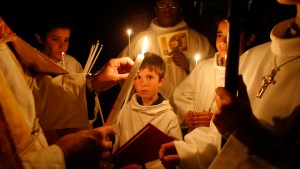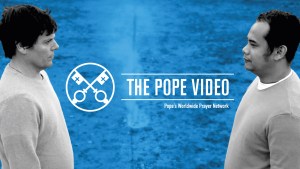Lenten Campaign 2025
This content is free of charge, as are all our articles.
Support us with a donation that is tax-deductible and enable us to continue to reach millions of readers.
A couple of years ago I had some business to attend to in New York City during Holy Week.
It had been a difficult Lent; some days I was trying too hard, other days I was phoning it in, and in terms of fruitfulness, the branches were pretty bare. I knew it was my own fault.
The business in Manhattan was neither fulfilling nor satisfying, and as I ambled into Penn Station, my interior dialogue was grumpy; I groused about my own failures as a human being, the fecklessness of other human beings, and my general dissatisfaction with the state of the world.
In that less-than-saintly mood — my default state — I decided I would await my train with a Guinness in my paw, nursing it along with all of my grudges.
Settled with an Irish stout, then, my position at the bar allowed me to see the schedule boards I needed for my train and also afforded me a full view of the escalators pulling people off the streets, and a cross-section of folks coming and going. The perspective was a people-watcher’s dream.
I had barely touched my beer and was vaguely agreeing with the man at the next stool that the Talking Heads was a great ’80s band when, for the merest moment, something happened.
For just the briefest instant, it seemed as though everything simply stopped; a full-on freeze frame.
The people walking by, the escalators full of people floating up or down, the groups gathering by the schedule board, the music and conversation around me — it all seemed to simply stop.
And in the space of a pulse — with the same sort of fleeting beat of affirmation that characterizes a pulse — I understood something in an instinctive and internal way that I cannot yet perfectly or even adequately describe.
I wouldn’t presume to say that anything was being communicated to me, but I nevertheless had a glimpse — or an overwhelming “sense” — of something. In that brief flash I knew that hovering over us, near us, within us, all about us was an awful, unstoppable ache of love and sadness; a sense of “Oh, my people! How often I have wanted to gather your children together as a hen protects her chicks beneath her wings, but you wouldn’t let me.”
This ache of longing, reaching out; of longing unanswered, unfulfilled.
It lasted the merest second, and then all was normal; everyone was moving; the radio was blaring. But for the rest of that Holy Week, nothing felt right to me. I was weepy and restless, and everything seemed unsuitable.
You see, this was not like Thomas Merton’s moment in Kentucky, and the joy-filled sense he had of people gadding about, shining like the sun. This felt more like a gloaming; like the space between dark and light that, of an ordinary twilight vespers, can bring such a sense of comfort and completion. And yet, this moment contained a note of what I can only characterize as desolation. Unfulfilled belonging.
Oh, my people …
There is a story about Blessed John Paul II, that he was once discovered in his private chapel with his arms about the tabernacle, crooning a song in Polish, as a mother might croon to a child. He looked up to his visitors with a distraught expression and said, “I don’t know how to comfort him!”
That is precisely what it felt like to me — as though I had one of my children in my arms, and he was inconsolable.
Nothing was the same after that moment. I could not be easy, or go on as I had. My lifelong fascination with politics ended — I found I could no longer write about political issues with conviction, because suddenly it all seemed so superficial, transient and disconnected (or only partially connected) to what is real. I sensed that what I had immersed myself in, almost since childhood, was a sinkhole of illusion meant to turn us away from the outreach of love that is the taproot of all that is true, and beautiful and good — the Christ who is reaching out to us, begging us to notice and reach back.
Holy Saturday is the terrible day of the empty; the tabernacles around the world are bare; there is no Holy Mass. All is silence, and we are ourselves bereft, seeking the Lord, mourning his absence and finally, finally reaching out for that pulse of life: Oh, my Lord …
In the subterranean Gethsemane of Penn Station, I learned that this longing is the merest fraction of the longing he endures for us.


